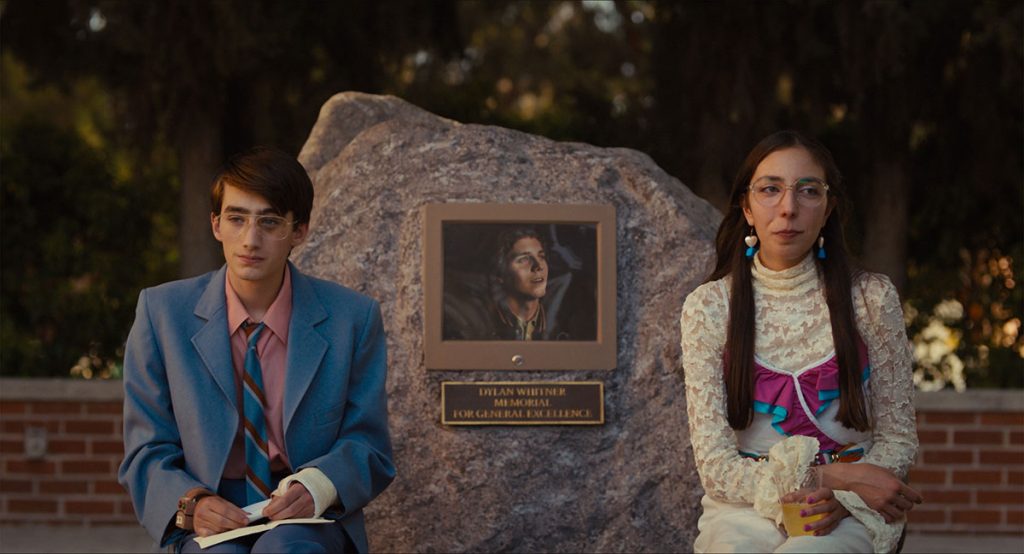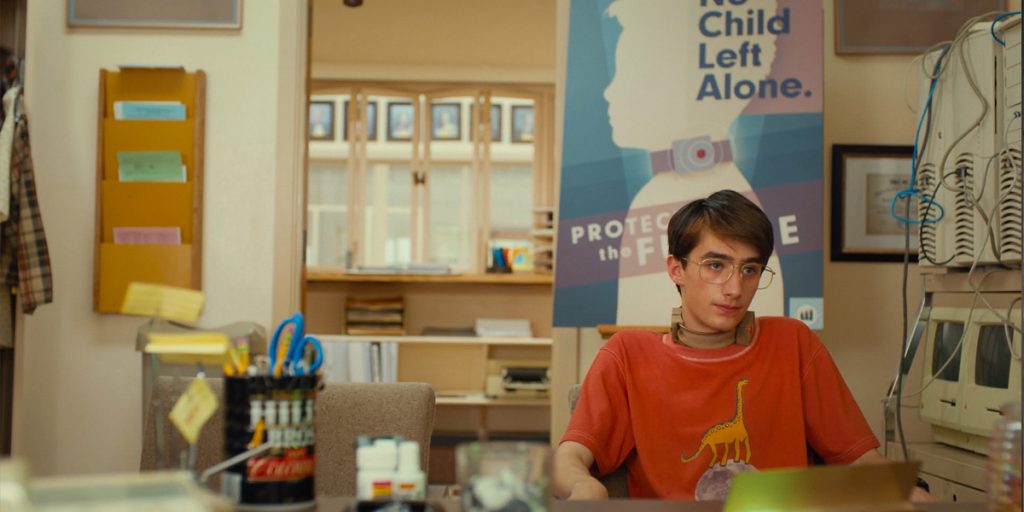Wyrm ’s dry and offbeat coming of age story explores our obsession with sex and relationships through its creative worldbuilding and awkward personality.
“I don’t want to be related to the only freak in ninth grade who can’t get his collar popped,” Wyrm (Theo Taplitz) is told by his twin sister Myrcella (Azure Brandi). Wyrm is reminded of his embarrassing situation again when Reggie (Davey Johnson), his school’s child development specialist, tells him, “You are literally the last incoming freshman to complete their level one sexuality requirement. Typically, osculation…kissing.” Set in a bizarre, retrofuturistic 90s alternate reality, Wyrm envisions a society where teenagers must wear electronic collars that can only be released once they pass their first sexuality test—their first kiss—known as getting their “collar popped.”
Living in a society where everyone around him is kissing and about to have sex, the lonely and awkward Wyrm desperately seeks to get his “collar popped.” Meanwhile, he’s dealing with a dysfunctional family life at home in the wake of his older brother Dylan’s recent death. His sister, Myrcella, doesn’t want anything to do with him, his mother is gone on a trip by herself, his father is either busy at work or stuck on the toilet with constant constipation, and his immature uncle Chet (Tommy Dewey, of Your Monster) and his Spanish-speaking girlfriend Flor (Natalia Abelleyra) look after him and Myrcella. However, after meeting Myrcella’s friend Izzy (Lulu Wilson), Wyrm just might get a chance at his first kiss and learn a thing or two about himself and navigating the messy, complicated, awkward world of love and relationships.
Written and directed by Christopher Winterbauer, Wyrm is the feature length adaption of his 2017 short of the same name. Wyrm is an assured debut feature, bursting with a vibrant energy and personality of its own. Between its bright color palette, dreamy synth score, and eclectic production design imagining an alternate version of the early internet era, Winterbauer offers a unique aesthetic vision flowing with dazzling creativity. He brings this same extroverted sense of style to his characters and story, injecting them with memorable, offbeat personalities that are just as charming as they are awkward. Most memorable is Wyrm’s deliciously dry and caustic sense of humor, that consistently elicits deserved laughs with its amusing and provocative bluntness, even if some of its jokes don’t always land.

At its core, Wyrm confronts our obsession with sex and relationships with its bizarre yet inventive premise. “Popping collars” is a clever analogy to sex (although there’s plenty of references to sex and even more frequent mentions of fingering), highlighting how much pressure is given to having sex for the first time, while the cumbersome electronic collars expose just how absurd our concept of virginity is. The film also calls our attention to the pressure and desire to have relationships just to have them, as those within the story are often dysfunctional and suffer from a lack of communication and understanding. Meanwhile, a sign at a bus stop warns of the dangers of being single with the phrase “don’t let our children become widows,” while Wyrm’s handbook for the “No Child Left Alone” campaign reads “being alone, not okay.”
Wyrm isn’t interested in moralizing about sex, but rather exposing how we value sex and relationships for the sake of having them, instead of cultivating happy, healthy sex lives and forging genuine connections. It’s also admirable how this fictional society celebrates sex and treats it with open discussion, as flawed as its approach is. Where the film does falter is that it’s heavily focused on heterosexual relationships. While we do see a lesbian couple kiss, it’s clearly a missed opportunity that we don’t see more sexually diverse representation and unfortunately in one scene the script plays on the tired “gay panic” trope just for a quick laugh.
Ultimately, Wyrm gets lost in its scattered script, and by the end, loses sight of its original premise. It’s kind of incredible just how many different things this 97-minute film attempts to be—a satire about our obsession with sex and virginity, a coming-of-age story about the awkwardness of navigating adolescent relationships, a story about grief and reckoning with the memory of someone you thought you knew so well, a story of a dysfunctional family, and a story about making sense of the world and your place in it. There’s too much going on, here, for there to be a cohesive and satisfying whole, and not all of the emotional beats successfully land since the overall story is spread so thin over so many different ideas. Despite these striking flaws, a remarkable sense of creativity and vibrant personality shine through, and Wyrm certainly makes for an entertaining watch despite its bumpy ride.

